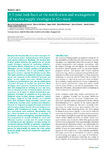2022-04-28Zeitschriftenartikel
A 5-year look-back at the notification and management of vaccine supply shortages in Germany
Miranda-García, Maria Auxiliadora
Hoffelner, Marcus
Stoll, Hagen
Ruhaltinger, Dörte
Cichutek, Klaus
Siedler, Anette
Bekeredjian-Ding, Isabelle
Background:
Unavailability of vaccines endangers the overall goal to protect individuals and whole populations against infections.
Methods:
The German notification system includes the publication of vaccine supply shortages reported by marketing authorisation holders (MAH), information on the availability of alternative vaccine products, guidance for physicians providing vaccinations and an unavailability reporting tool to monitor regional distribution issues.
Aim:
This study provides a retrospective analysis of supply issues and measures in the context of European and global vaccine supply constraints.
Results:
between October 2015 and December 2020, the 250 notifications concerned all types of vaccines (54 products). Most shortages were caused by increased demand associated with immigration in Germany in 2015 and 2016, new or extended vaccine recommendations, increased awareness, or changes in global immunisation programmes. Shortages of a duration up to 30 days were mitigated using existing storage capacities. Longer shortages, triggered by high demand on a national level, were mitigated using alternative products and re-allocation; in a few cases, vaccines were imported. However, for long lasting supply shortages associated with increased global demand, often occurring in combination with manufacturing issues, few compensatory mechanisms were available. Nevertheless, only few critical incidents were identified: (i) shortage of hexavalent vaccines endangering neonatal immunisation programmes in 2015;(ii) distribution issues with influenza vaccines in 2018; and (iii) unmet demand for pneumococcal and influenza vaccines during the coronavirus disease (COVID)-19 pandemic.
Conclusion:
Vaccine product shortages in Germany resemble those present in neighbouring EU states and often reflect increased global demand not matched by manufacturing capacities.
Files in this item

